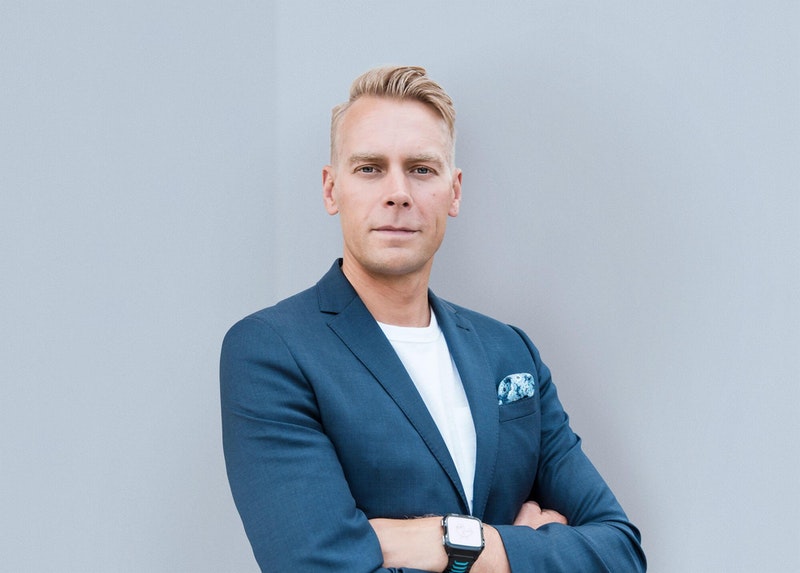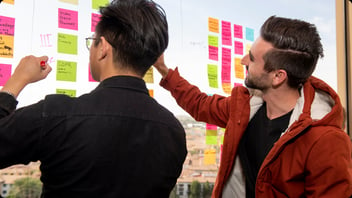Rob Patterson: Welcome to the American Advertising Federation's podcast. My name is Rob Patterson, and I'm here to welcome Ville Houttu, who's the CEO of Vincit, which is a Finland-based software company, who has recently acquired Xtopoly, and now has an office here in Orange County.
Rob Patterson: Today we're going to talk about software development, marketing, what that means for brands, as well as moving your company to Orange County, California.
Rob Patterson: Welcome, Ville. Thank you for doing this podcast.
Ville Houttu: Thanks for having me.
Rob Patterson: Certainly. So, why don't we start at the beginning. Can you talk a little bit about the premise of how Vincit was founded?
Ville Houttu: Well, it starts from the fact that we wanted to create a place where even Mondays don't suck. We started as a very employee-focused company. And instead of focusing on growth, we focus on our growth enablers with our people, our employees and our clients. And all the key performance indicators that we have, our KPI's are within the two things, happier employees and happier clients. We actually noticed that if we managed to be successful on those two areas, we are, we will grow fast. And we are highly profitable. And during the 11 years, we are now for 100 employees, in two countries, Finland and California.
Rob Patterson: One of the things I read about was the management philosophy called LAAS. Can you talk a little bit about that?
Ville Houttu: Yeah. We changed quite a bit of how we manage our employees, or we actually don't manage them anymore. So we used to have the traditional model where you have leadership, you have middle management, and then you have teams under it. But we noticed that the middle managers weren't happy, because they used to developers. Software developers. And the only thing they wanted to do was to code. And the coders, or the team members under them, weren't happy because they had crappy managers who only wanted to code. So we removed the whole middle management layer.
Rob Patterson: Wow.
Ville Houttu: And so instead of leading with policies and restrictions, we have, we try to maximize the trust and transparency in the company.
Rob Patterson: So have you noticed a significant difference in the excitement or the energy or the ability of your workers to want to work harder and better?
Ville Houttu: Yeah, yeah. Obviously, otherwise we wouldn't do it or haven't done it. But, yeah, so the thing is, the more you trust your employees, the more they trust you. And just, I know the trust factor is risk-taking. And this is a risk-taking game. But if it works, it means you don't have to manage your employees. They'll manage themselves.
Rob Patterson: So can you tell us a little bit more about your company? I know you're a software developer. You do custom software, tailored software, I should say. Can you tell us specifically the type of applications that you create? Is it apps? It is website? Is it all of the above, or? Tell us a little bit more.
Ville Houttu: It kind of is. It all starts from the other user. And that's why we have quite a bit of designers, user experience and service designers in the company, so that we don't just jump and implement something people don't need. Some of the clients we worked with, Yamaha is a good example, where we've implemented their mobile applications for the wave runners in boats. We work with other companies as well, big brands like Logitech, Kellogg's, and few other local ones over here
Rob Patterson: So do you do work specific to that, I guess it depends on the client, right? So if it's Yamaha, would your software go in the actual product? Or is it to promote the product?
Ville Houttu: We can do either or. And that's a really good question, because companies like GE Healthcare where we implement their, or we provide software for their patient monitors, it's only a part of the function. It can be, even though we had a big thing working on something, it might be a small part. When again, in case of Yamaha, it's a standalone, or more or less standalone, mobile application that you can download from the app store and start using. Of course, it integrates to the backend system that and be a systems that they have in place. So it comes, it's a standalone, but it comes, it's a part of the whole system.
Rob Patterson: So do you work with the direct client? Do you work with a separate agency? Or do you kind of do a little bit of everything? For instance, how do you, how does someone come to you and how do they know what they want? Do they already know that they want some kind of software application to do a certain task, and then it's your company's job to do that? Or do you work with another marketing entity that comes to you with something for your team to solve?
Ville Houttu: A part of the reason we acquired Xtopoly was, we actually have the marketing and we have the strategy. We have branding and the design. And it's extremely important because usually, companies, when they come to us, they really don't know what they want. They might have an idea, but it's something we have to brainstorm, workshop, explore and research. So, but how do companies come to us? They might have a specific need. Usually they don't.
Rob Patterson: So the company is going to say, we have this issue or this pain point, or we need this solved, and then your team will work with them to kind of brainstorm and come up with, I guess, a solution and create software to fit that, depending on what that need is, right?
Ville Houttu: Exactly. Or might decide not to, because not all ideas are great. So we always, we work with the client to figure out, is this the right question we're asking. Or is there another question we should actually be answering. And eventually, implement something and design something that'll bring you more than the other.
Rob Patterson: Finland is well known for their code, right? They're known for development. Why did you decide to move your office or, I should say, establish your office here in Orange County, California?
Ville Houttu: Finland was actually just quite recently awarded as the happiest place in the world. Or the happiest country in the world. And it makes me the happiest person in the world because I'm a Finn and I live in Orange County. But the reason actually in here, I didn't set up this, the company, in Orange County, but actually in the Bay Area. But I moved it down to Irvine after six months, due to the fact that it's really difficult to compete with the big companies, and also we started having more and more traction over here with the clients we had.
Rob Patterson: I would imagine that Finnish culture is a little bit different than culture here in California. Can you talk a little bit maybe about the difference of the philosophy or the motivation or the differences of the two types of environments?
Ville Houttu: Yeah, it's actually really easy to compare because I flew back from Finland yesterday.
Rob Patterson: Oh, wow.
Ville Houttu: Some of the differences that I didn't realize, whether are quite obvious. And it seems like the Finnish people, they don't speak much but when they speak, they say a lot. And so, when again, I think here, there's a lot more friendly noise without really data being transferred from the people you talk with. But one of the things that surprised me the most was how warm welcome the people, the companies, and developer community have given us as a brand new company. Being operating here only for a year, and already have a lot of friends as clients, employees and developer community.
Rob Patterson: So would you say that kind of surprised you about being in Orange County? Or did you kind of have that expectation that they're friendly people, it's sunny all the time, that kind of environment.
Ville Houttu: Yeah, I get that I'm in Europe from here. But the expectation I had was that there a lot of well-established companies, and people who've lived here for a long time, so it's kind of hard to get in to Orange County. And I was expecting it to take longer. But it's actually really, really easy, easy place for companies to set up and meet other people and companies. So it's all positive.
Rob Patterson: Obviously, this is the American Advertising Federation, and we talk about marketing and software development. There's a lot of areas. Mobile apps. There's sites, there's all sorts of things. How do you think software or development fits into kind of the marketing world?
Ville Houttu: It does fit. It's like your engine in your car. I don't know what kind of car you drive, but it's almost everything we do has something to do with either marketing or e-commerce. And so, and marketing, as you know, is very data driven, and it's getting even more so. So, the better we target our marketing, the better we are in our businesses in the future, so. And that's a big portion of what we do today.
Rob Patterson: So what do you think the, I don't know, the future holds for software? I mean, there's so many things you hear about, you read about. Augmented reality and artificial intelligence, and all these different things. Is that something that is just a cool buzzword, or that something that's actually going to make a difference in our lives and our marketing?
Ville Houttu: I think so, but I think, and we've already seen some of the signs of people getting more and more conscious on the data they're giving out. And as marketers, and for all the marketing agencies, it's a fact they have to take into account.
Rob Patterson: As far as being, doing those innovative technologies and applications and everything else?
Ville Houttu: Yeah. So, it's not only the technology that enables new things, but we also have to take into account the environment we are in.
Rob Patterson: Well, I appreciate your time to do this. This has been fantastic. Before we wrap up officially, is there a website that people can learn more about your company?
Ville Houttu: Yes. So it's vincit.com.
Ville Houttu: And it's brand new. So anyone has any ideas on how to make it better, just let us know and we will do.
Rob Patterson: Sounds good. Thank you so much for your time today.
Ville Houttu: Thank you.
Rob Patterson: I appreciate it.



